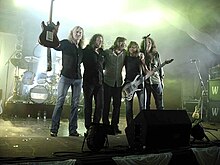Karat (band)
| Karat | |
|---|---|
 |
|
| Background information | |
| Origin | Berlin, Germany |
| Genres |
Rock Pop music |
| Years active | 1975– |
| Labels |
Amiga Teldec BMG Ariola edel |
| Website | Official website |
| Members | Claudius Dreilich (vocals) 2005-present Christian Liebig (bass guitar) 1986-present Michael Schwandt (drums) 1976-present Bernd Römer (guitar) 1976-present Martin Becker (keyboards) 1992-present Ulrich "Ed" Swillms (guest, keyboards) 1975-1987, 2005-present |
| Past members |
Herbert Dreilich (vocals) 1975-2004, died 2004 Henning Protzmann (Bass guitar, management) 1975-1986 Hans Joachim Neumann (vocals) 1975-1977 Ulrich Pexa (guitar) 1975-1976 Konrad Burkert (drums) 1975-1976 Thomas Kurzhals (keyboards) 1984-1992, died 2014 Thomas Natschinski (keyboards) 1981-1984 |
Karat (Ger. for "carat") is a German rock band, founded in 1975 in East Berlin, then part of the German Democratic Republic. Karat also gained a strong following in West Germany when its 1982 album Der blaue Planet (The Blue Planet) was one of the year's top sellers in both East and West Germany, making Karat one of the more prominent bands in German-language rock music.
Karat developed out of the East Berlin jazz-rock fusion group Panta Rhei, which lost much of its focus in 1973 when its lead-singer Veronika Fischer left to pursue a solo career, and dissolved in 1975 when three further members left to form a new band named Karat. The initial Karat lineup consisted of: singer Hans-Joachim "Neumi" Neumann, keyboardist and songwriter Ulrich "Ed" Swillms, bassist Henning Protzmann, drummer Konrad "Conny" Burkert, acoustic guitarist Herbert Dreilich, and electric guitarist Ulrich Pexa. The following year Burkert was replaced by Michael Schwandt, and Pexa by Bernd Römer. Neumann left in 1977 due to military service, after which Austrian-born Dreilich became the band's vocalist.
By 1978, Karat had released several singles, and these were compiled together with other original songs into a debut self-titled album. Although most of this was fairly pedestrian German-language rock, it contained the hit single "König der Welt" ("King of the World"), a song which stood out and established Karat's signature style of a melodic brand of progressive rock. Poet Kurt Demmler wrote the words to this song, which like much of Karat's later output were philosophical in character.
Karat's second album, titled Über sieben Brücken (Across Seven Bridges) and released in 1979, brought the band a great deal of attention. It included the seven-minute long, classically structured "Albatros" ("Albatross"), the lyrics to which ("... der Albatros kennt keine Grenzen."/"... the albatross knows no borders.") had a double meaning that implied an indirect criticism of the GDR's austere travel restrictions and the Berlin Wall. The title track "Über sieben Brücken mußt Du geh'n" ("You Must Cross Seven Bridges") is still the band's best-known song. Its deeply moving personal reflection introduced Karat to audiences outside of East Germany, especially when West German singer Peter Maffay recorded a cover version of it that became a massive hit for him in 1980.
...
Wikipedia
